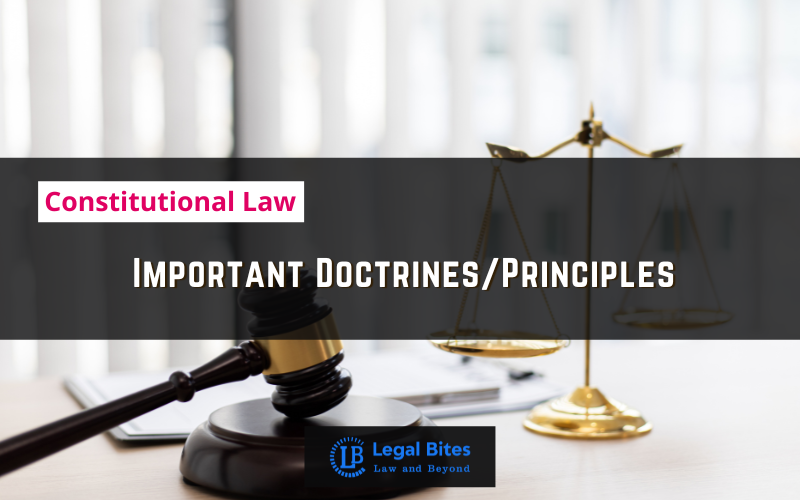What do you understand by Fundamental Rights? How do they differ from other rights? Are they amendable? Refer to important Supreme Court decisions on the subject.
Find the answer to the mains question of Constitutional Law only on Legal Bites.;

Question- What do you understand by Fundamental Rights? How do they differ from other rights? Are they amendable? Refer to important Supreme Court decisions on the subject. [BJS 1991] Find the answer to the mains question of Constitutional Law only on Legal Bites. [What do you understand by Fundamental Rights? How do they differ from other rights? Are they amendable? Refer to important Supreme Court decisions on the subject. [BJS 1991]] Answer Part III of the Constitution of India lists...
Question- What do you understand by Fundamental Rights? How do they differ from other rights? Are they amendable? Refer to important Supreme Court decisions on the subject. [BJS 1991]
Find the answer to the mains question of Constitutional Law only on Legal Bites. [What do you understand by Fundamental Rights? How do they differ from other rights? Are they amendable? Refer to important Supreme Court decisions on the subject. [BJS 1991]]
Answer
Part III of the Constitution of India lists the Fundamental Rights and also mentions the limits on these rights. The word fundamental suggests that these rights are so important that the Constitution has separately listed them and made special provisions for their protection. The Fundamental Rights are so important that the Constitution itself ensures that they are not violated by the government. In this regard, the Judiciary has the powers and responsibility to protect fundamental rights from violations by actions of the government.
Executive, as well as legislative actions, can be declared illegal by the judiciary if these violate fundamental rights or restrict them in an unreasonable manner. However, fundamental rights are not absolute or unlimited rights. Government can put reasonable restrictions on the exercise of our fundamental rights, but no organ of the government can act in a manner that violates them.
Moreover, Fundamental Rights are different from other rights available to us. While ordinary legal rights are protected and enforced by ordinary law, Fundamental Rights are protected and guaranteed by the constitution of the country. Ordinary rights may be changed by the legislature through the ordinary process of law-making, but a fundamental right may only be changed by amending the Constitution itself. So, yes fundamental rights as enshrined in the Indian Constitution are amendable under Article 368. This has been decided by the Supreme Court in a series of cases which are discussed below
Shankari Prasad v. Union of India (AIR 1951 SC 458)
The validity of the First Amendment Act to the Constitution was challenged on the ground that it purported to abridge the Fundamental rights under Part III of the Constitution of India. Supreme Court held that the power to amend the Constitution, including Fundamental Rights was contained within Article 368 of the Constitution itself. An amendment is not a law within the meaning of Article 13(2) because this provision states that the State shall not make any law which takes away or abridges the rights conferred by this Part and any law made in contravention to this clause shall, to the extent of the contravention, be void.
Sajjan Singh v. State of Rajasthan (1965 AIR 845)
The validity of the 17th Amendment Act, 1964 was challenged on the ground that one of the acts inserted by the amendment in the Ninth Schedule affected the petitioner on the basis that the amendment fell within the purview of Article 368 and the requirements in the proviso to Article 368 had not been complied with. Supreme Court approved the judgment in the Shankari Prasad case and held that on Article 13 (2) the case was rightly decided. The amendment includes an amendment to all provisions of the Constitution.
Golaknath v. State of Punjab (1967 AIR 1643)
The Supreme Court prospectively overruled its decision in Shankari Prasad and Sajjan Singh cases and held that Parliament had no power to amend part III of the Constitution so as to abridge or take away any of the Fundamental Rights. It also added that Article 368 merely lays down the procedure for the purpose of amendment. Further, the Court said that an amendment is a law under Article 13(2) of the Constitution of India, and if it violates any fundamental right, it may be declared void.
The Golaknath case created a lot of difficulties and as a result, the Parliament enacted the 24th Amendment Act, 1971 whereby the power to make an amendment to the constitution and the procedure thereof was given to the Parliament.
However, the question regarding the extent of the power of the Parliament to amend under Article 368 was discussed in the Kesavananda Bharati Case 1973, where the Supreme Court overruled its decision in Golaknath’s case and held that even before the 24th Amendment; Article 368 contained power as well as the procedure for amendment. The majority bench held that there are inherent limitations on the amending power of the Parliament and Article 368 does not confer power so as to destroy the Basic Structure of the Constitution.
Important Mains Questions Series for Judiciary, APO & University Exams
- Constitutional Law Mains Questions Series Part-I
- Constitutional Law Mains Questions Series Part-I
- Constitutional Law Mains Questions Series Part-II
- Constitutional Law Mains Questions Series Part-IV
- Constitutional Law Mains Questions Series Part-V
- Constitutional Law Mains Questions Series Part-VI
- Constitutional Law Mains Questions Series Part-VII
- Constitutional Law Mains Questions Series Part-VIII
- Constitutional Law Mains Questions Series Part-IX
- Constitutional Law Mains Questions Series Part-X



